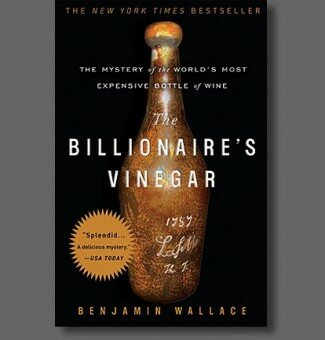Vintage tale: 'Billionaire Vinegar' author visits Monticello
 The Billionaire's Vinegar: The Mystery of the World's Most Expensive Bottle of Wine tells the story of the controversy surrounding a bottle of wine thought to be owned by Thomas Jefferson. PUBLICITY PHOTO
The Billionaire's Vinegar: The Mystery of the World's Most Expensive Bottle of Wine tells the story of the controversy surrounding a bottle of wine thought to be owned by Thomas Jefferson. PUBLICITY PHOTO
In September 2007, an article in the New Yorker ["The Jefferson Bottles," by Patrick Radden Keefe] rocked the wine world.
It told the story of the most expensive bottle of wine ever sold at auction, a 1787 Ch¢teau Lafite supposedly found in a cellar wall in Paris that was believed to have been the property of Thomas Jefferson. As the article explains, Jefferson, a certified wine nut (spending the equivalent of $120,000 on wine during his presidency), was America’s Minister to France, and when he returned to America he continued to order French wine for himself and George Washington, requesting in one letter that the shipments be marked with their initials. The bottle in question had been engraved with the initials “Th.J.”
In December 1985, at Christie’s in London, Christopher Forbes, the son of Malcolm, paid $157,000 for the bottle. Following the hoopla, another tycoon, one Bill Koch, would spend $500,000 on four bottles of the discovered wine.
In 2005, the Boston Museum of Fine Arts presented an exhibition of Koch's many collections, and so Koch asked the folks at Monticello to help find him out exactly where in France the wines came from.
After preparing a report, the article says, Monticello’s curator, Susan Stein, contacted Koch and told him, "We don’t believe those bottles ever belonged to Thomas Jefferson.”
However, Monticello's researchers may have already suspected it was a fake 20 years earlier.
"When this wine was in the news in 1985, the Thomas Jefferson Foundation received numerous inquiries regarding our knowledge of and/or opinion about it," says Wayne Mogielnicki, Monticello's director of communications. "A staff researcher was assigned the task of writing a report on this subject and prepared an internal report in December 1985. It was later made available to researchers."
Indeed, that "staff researcher" was Lucia Stanton, future director of research at Monticello [Stanton would also be a principal contributor to the report that accepted the probability that Jefferson fathered Sally Hemings' children, and author of two acclaimed books, Slavery at Monticello, and Free Some Day: The African-American Families of Monticello].
While Stanton gave the purveyor of the bottles, German music publisher Hardy Rodenstock, as well as Christie's wine expert Michael Broadbent, the benefit of the doubt, considering they were "men of unquestioned knowledge and integrity," she provided little to suggest the bottle was owned by Jefferson.
For starters, Jefferson was a meticulous record keeper.
"He kept a daily financial memorandum book recording all his receipts and expenditures," writes Stanton. " He himself put so much faith in this document that he said he would vouch for its accuracy and completeness 'on the bed of death.'"
Wine orders during that time appeared in letters, letter records, the memorandum book, and customs records and bank statements that TJ kept, but a 1787 Ch¢teau Lafite Bordeaux does not appear anywhere.
Despite meticulous records of his wine purchases, and the discussion of wines, Stanton finds "no mention by Jefferson of ever desiring to have a Bordeaux wine of the 1787 vintage."
Also, Stanton points out that "Th:J" with a colon was the shorthand Jefferson used for his initials, not the “Th.J.” found engraved on the bottle.
In the end, Stanton concludes that her "own doubts remain" and that she is "unable to make the same leap of faith" that Rodenstock and Broadbent made by "connecting the bottle to Jefferson because they bear his initials."
"I think it is a question of someone other than Jefferson," write Stanton, "and perhaps there is an equally fascinating story there."
Since 2005, the on-going investigation and legal battle to determine if the bottles Rodenstock was selling are fakes or not has become more and more complex, involving the FBI, private investigators, wine experts around the world, and the alleged wine-con-man at the center of the controversy.
According to Mogielnicki, Stein and other members of Monticello's staff are unable to comment, as they may be called to testify in legal proceedings.
They may also see famous actors playing them in the movie version of the story.
Last year, Brooklyn-based author Benjamin Wallace came out with a book about the Jefferson bottles, The Billionaire's Vinegar: The Mystery of the World's Most Expensive Bottle of Wine, which made it on to the New York Times Bestseller List, and is in the process of being made into a movie.
So, have the folks at Monticello heard any word about who might be playing some of them in the movie?
"I'll have to contact our Hollywood office," says Mogielnicki.
On Thursday, June 25 at 6pm Wallace comes to Monticello's West Lawn to discuss and sign copies of his book. There will be an outdoor reception with wine and hor d'oeuvres. Tickets for the event are $35 and they must be purchased in advance through Monticello's website at monticello.org or by calling 434-984-9880.
Updated: June 12, 2009 12:35pm
1 comment
good one Wayne!